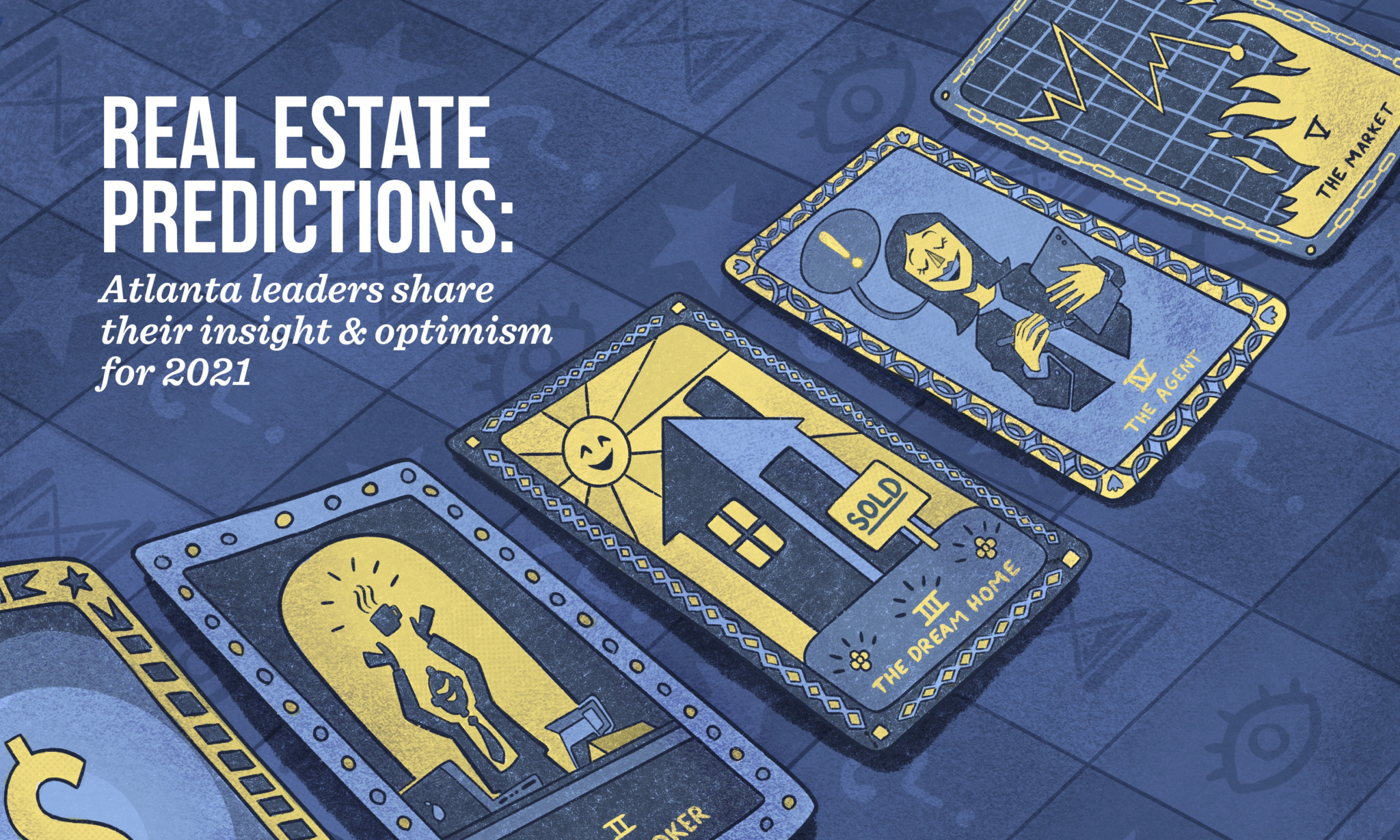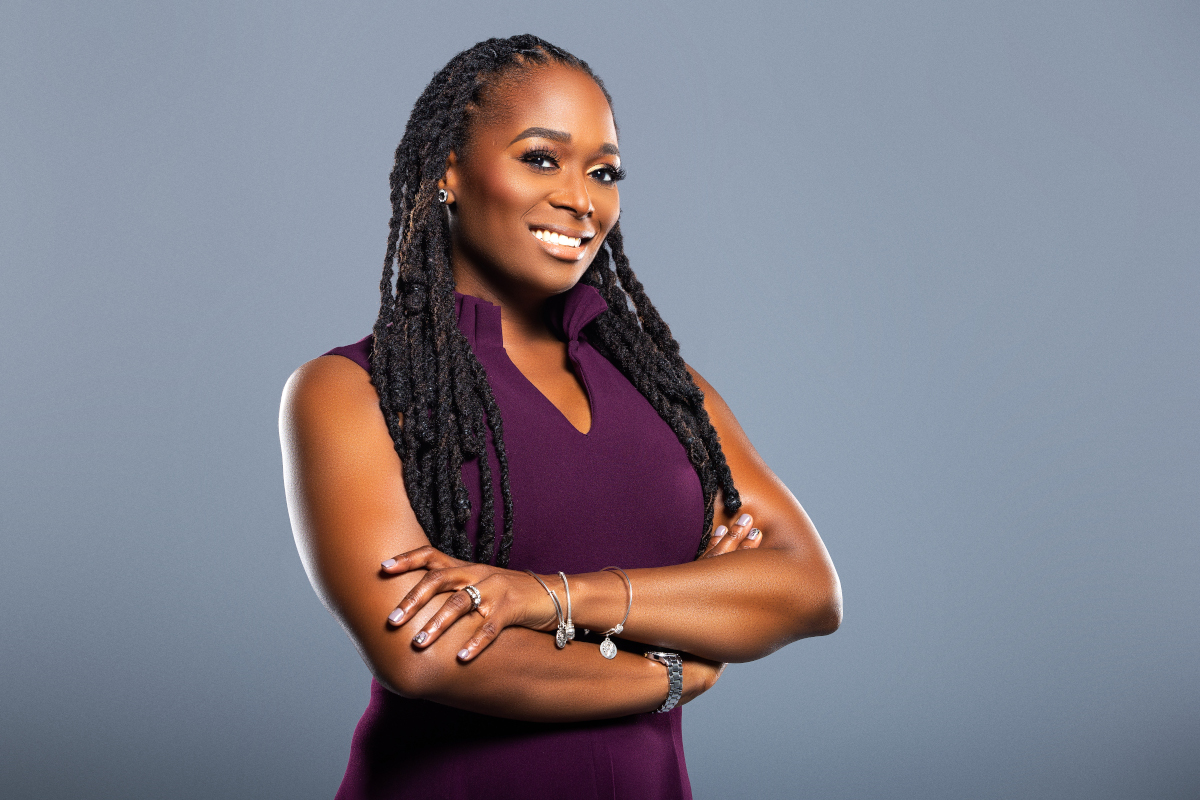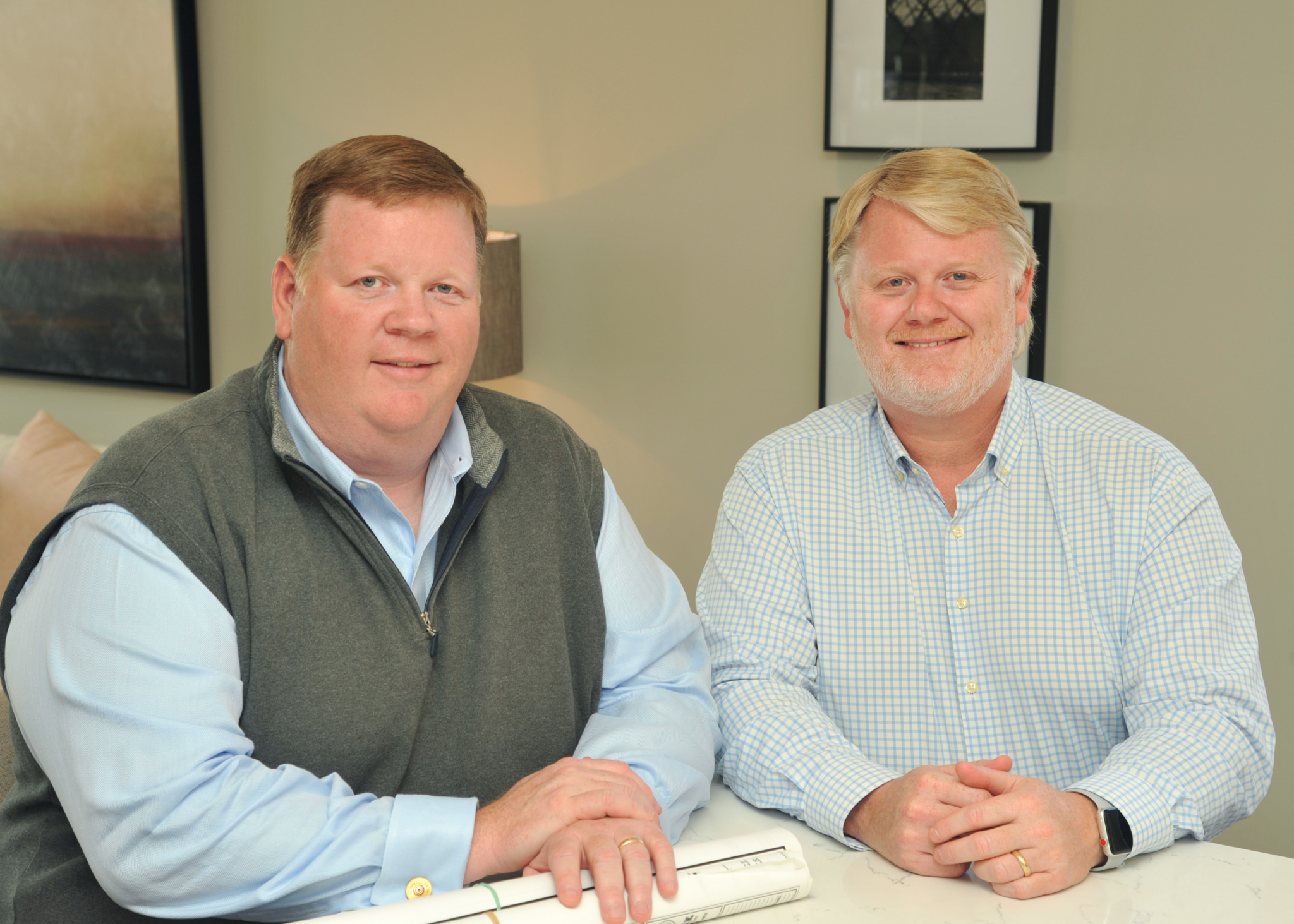
Happy days are here again in 2021? With a vaccine making its way across the globe at lightening speed, there appears to be a light at the end of the pandemic tunnel, but what does the future hold for residential real estate? We spoke with some of the biggest names in Atlanta real estate to get their take on 2021.
Our panel of experts includes:
- Christa Huffstickler, founder and CEO, Engel & Völkers Atlanta
- Chief Operating Officer Chris Poston and Executive Vice President Clif Poston, Traton Homes
- David Tufts, CDO and managing partner, @Ansley Developer Services
- Kelly Allison, southeast division vice president, New American Funding
- Jim Jacobi, founder, Parkland Communities, Inc. and Alliance Engineering + Planning, LLC
- Kyshona Gresham, vice president – mortgage lending, Guaranteed Rate Affinity
- Stephen Haines, president, Artisan Built Communities
We’ve all been weathering the changes that COVID-19 brought into our lives. What revelations have you learned about your business over the last year? Will any of this apply to the way you do business in the future?
Christa Huffstickler, founder and CEO, Engel & Völkers Atlanta: There’s been a paradigm shift in the residential real estate industry, and it has illuminated an opportunity to reinvent how we approach our business and better excel for buyers and sellers. When the pandemic first hit, our team instantly made the shift to an all digital platform, which we’d already invested in significantly to streamline the home buying and selling process for clients. Digital is the direction our industry is moving towards anyways, so we were prepared to pivot. We found that doing so allowed us to empower our clients to do their due diligence ahead of time. They were able to screen properties using virtual brochures and video technology, which proved to be a more productive use of time for all parties. We were able to get through important processes such as pre-qualifications more quickly, and that enabled our agents to do more business. Even beyond the pandemic, we’re hoping to keep those digitally-enhanced practices for the long-term.
David Tufts, CDO and managing partner, @Ansley Developer Services: COVID-19 has shown us the resilience of the real estate industry and confirmed the value of communication. The pandemic has also sped up the adoption of virtual showing technology, and agents, buyers, and sellers have become much more comfortable with it over the last year. Virtual showings are definitely here to stay, and will be incorporated into presentations moving forward.
Kelly Allison, southeast division vice president, New American Funding: There really are two unintended benefits derived from the pandemic this year. One is our LOs/operations team now understand fully how effective they can be doing their job remotely and the other is this pandemic has forced everyone to embrace technology more. Since New American Funding is more technology forward this has really played to our advantage. I think the forward looking impact we can now consider is the potential for wholesale change in the requirements for our branch network which should create cost cutting opportunities imperative with the compressing margins we are sure to experience.
Jim Jacobi, founder, Parkland Communities, Inc. and Alliance Engineering + Planning, LLC: By far, the biggest revelation/change for my business has been the adaptation of virtual meetings into governmental processes. I have virtually participated in numerous zoning hearings, community meetings and municipal staff meetings. This was never done prior to Covid and believe it will be a permanent change moving forward. There are pros and cons with this change, but I believe this change is for the better overall. The biggest “pro” is the increased citizen/community involvement and awareness in local government. It is much easier to virtually participate in local public hearings from the comfort of your home instead of driving to city hall. The biggest “con” is it seems to take much longer now to make progress on any project whether it is zoning, permitting, or inspections. These delays hinder the supply of new lots and homes to the market.
Kyshona Gresham, Vice President – Mortgage Lending, Guaranteed Rate Affinity: What COVID-19 has taught me is that you have to be ready to evolve your business as society changes. You cannot stay “stuck in your ways”. Also, that you are truly the CEO of your business. YOU decide whether you will succeed or fail. It’s all in your mindset. During COVID-19, I have put more families into homes than I ever had. I have always been an innovator when it comes to my brand, but COVID-19 has definitely given me more ideas on how to upgrade the client’s experience.
Chief Operating Officer Chris Poston and Executive Vice President Clif Poston, Traton Homes: COVID-19 has definitely had a huge impact on the way we live and work. 2020 challenged us to be innovative with all facets of our business, incorporating COVID protocols that included virtual sales appointments, virtual walk throughs of our homes and even virtual closings. We also created new internal processes that allowed for remote working, remote invoice approvals and Zoom meetings. While some of these practices have been very effective saving both time and money, we’ve found that others are more effective when done in person.
Assuming we are still dealing with the pandemic for many months to come, what changes should we expect in the Atlanta real estate market in 2021? If a vaccine is distributed next year, what impact will that have on the real estate market?
Chris and Clif Poston: I am optimistic that if interest rates stay low, more buyers will come into the market; however, there are still many people that are not comfortable with the buying experience due to COVID.
Huffstickler: I think there will be a continuation of what we are already seeing proliferate in the market. Buyers are wanting defined spaces that allow multiple individuals to cohabitate and private access to outdoor spaces to enjoy the fresh air. This year, we saw a big demand increase in townhome and single-family, combined with a decrease in available inventory. If a vaccine is distributed, and people get back into their offices, the city’s traffic patterns will likely revert to pre-pandemic levels and people are going to rediscover the allure of living in city cores. We expect the condo market to be reinvigorated as more people flock to the city to take advantage of all it has to offer.
Tufts: We are in the very early innings of a real estate bull market that will impact both urban and suburban markets. The pandemic was the match that lit the fire, but there are other factors driving the market, including demographics, economics, psychographics and wealth transfer between generations. These will continue to fuel increased homebuying over the next few years.
Allison: I feel we will see a net migration from the more populated city centers to more suburban areas due to the appreciation of most businesses that their workforce can be quite effective working from home. I don’t think a timely vaccine will alter that reality and you will see that trend proliferate.
Gresham: With the Atlanta market, in my opinion, we will continue to see an increase as more companies and the entertainment industry bring more people. I honestly have no opinion nor idea what the vaccine would do to our market. We will just have to wait and see.
Jacobi: I fully expect the housing supply to further constrict, especially if the vaccine eliminates Covid because the economy will surge. There is a severe lot crisis in Atlanta and it is about the make the housing crisis go from bad to worse. Homebuilders are currently building homes faster than new lots can be created. According to the latest Metrostudy data, the vacant lot supply in Atlanta is down 10.6% YoY. I expect this trend to continue, which will reduce the future supply of homes. It takes a minimum of 24 months to complete a new community from purchase contract to final plat due to excessive regulations and understaffed municipalities. It simply takes too long.
Stephen Haines, president, Artisan Built Communities: Generally speaking, I think people like to feel safe, and this recent demand is around people wanting to feel like they are in better environments. For us, that means bigger homes if they predict they are working from home indefinitely and newer homes as they prefer the updated filtration and installed products that help protect their health. The vaccine will help everyone return to normalcy way faster than without it — I think that applies in and out of our industry.
Do you think the trend of homebuyers leaving cities for suburban areas is real, and if so, do you think it will continue in 2021? Why?
Jacobi: I do not believe there is an intentional mass exodus from cities. I believe we are seeing “drive until you qualify” on an unprecedented scale since working from home has become more prevalent. The commute time is not as important or relevant as it used to be for consumers.
Gresham: I do believe it is real. I have noticed fewer condo sales and more single family homes. Due to COVID-19, people have traded the close-knit city life for more space between neighbors suburban life.
Haines: I have seen data that actually confirms it. It’s not huge, but the 10-year trend of migration into the larger cities has reversed and we have had clients tell us they were leaving the city.
Huffstickler: People definitely migrated to the suburbs, but only in the short-term. Working from home was a major catalyst for this. When you don’t have to commute to the office anymore, living in the suburbs makes sense because you’re getting more bang for your buck. People also weren’t able to enjoy city life because most things were closed during the height of the pandemic. Once those macro amenitized aspects of city life come back along with the return to the office, they’ll make the city home again. Whether it happens next year or in 2022, there will be a shift back to in-town living.
Tufts: As was the case in many larger cities in the U.S., those who were previously thinking about moving to the suburbs decided to do so in 2020. COVID-19 changed peoples’ habits but not their desires. As the vaccine is distributed, the city will continue offering the same conveniences, amenities, and benefits, and the desire for those items will resume as they become more accessible.
Allison: Yes … I do think it is real and likely to continue. I feel states will need to respect the employees ability to not only move to suburban areas but also to move to more income tax-friendly states, so the issue of taxation should become a hot topic of conversation amongst our local politicians.
Chris and Clif Poston: I believe it is real. I think that COVID and the work from home movement has changed the way people think about how they live. With daily commutes no longer a concern, more people are choosing to leave densely populated areas for the space and value offered in the suburbs. The growth of suburban town centers offers the best of both worlds with more space and an abundance of amenities.
All things considered, do you expect your 2021 business to thrive, decline or remain stable? Why?
Allison: While I do expect our business to thrive in 2021 it wont be without some challenges as the industry experts now expect a material reduction in refinance volume. This reduction should be offset somewhat by increase purchase volume which is where we focus so I feel this impact will be somewhat mitigated; although, the reduction in overall volume should put downward pressure on profits, so cost cutting throughout this probable outcome will be imperative.
Gresham: My business will always thrive, no matter what obstacles are thrown at me. It’s all in your mindset.
Chris and Clif Poston: We believe that our business will thrive in 2021. Rates are low, and there is still a historically low level of inventory with respect to both homes and lots.
Jacobi: I am optimistic on the 2021 market. It is the perfect storm for my business of providing lots. I am currently working on several new projects in the right locations that will hit the market at the right time.
Huffstickler: Despite the challenges of 2020, our brokerage has continued to experience exponential year-over-year increases since launching back in 2016. We’ve strengthened our position in the market and Engel & Völkers Atlanta is one of the most productive firms in Atlanta. With interest rates being at an all-time low, big tech companies investing in Atlanta, and a low cost of living, there are plenty of positives buoying the market right now. These factors make Atlanta a very attractive place for people to move, so I think Engel & Völkers Atlanta will see even more growth in 2021. The real estate market is already flourishing, so once the economy begins to stabilize further there will be a ton of potential to thrive.
Haines: We are expecting moderate increases from this year. Why? The demand allowed us to build a bigger backlog going into 2021
Tufts: Business will thrive. As the market recovered this year, housing demand has been very strong and will continue to be in 2021. New construction and the idea of a home that has never been lived in is particularly appealing, and @Ansley Developer Services represents a great variety of product in desirable locations – both low density and high-density areas. Projects like Seven88 and Graydon are the cream of the crop, and now is a great time for buyers to get into those homes.
What will be the biggest challenges and opportunities for agents, lenders and brokers in 2020?
Huffstickler: The biggest challenge this year was combatting the fear of the unknown. No one knew what to expect, as this was completely uncharted territory. We had to flip the switch on our business and reinvent operations, which honestly became our biggest opportunity. There were a few agents and firms hanging onto the old way of doing things and not embracing tech. This situation forced them to do so, and they realized how much more efficient it is to use technology to our advantage and ease the process of homebuying and selling for clients. We can expect this newfound mass adoption of tech tools to proliferate in the years to come.
Tufts: One of the biggest challenges the industry will face in 2021 is keeping up with demand. This will be a very strong year, as rates are low and supply is tight. If vaccine distribution is successful, 2021 has the potential to be an even strong year than 2020 in terms of market activity. Millennials and first-time buyers offer a great opportunity in the industry as more people come out of rentals and their parents’ homes. We saw people moving back home during the pandemic due to concern about their housing or job situations. They saved money, and they saw their friends buy homes and rave about the lifestyle of homeownership. Now they are ready to be a part of it.
Allison: I feel one big challenge will be from the evolution of the home buyer to start their homebuying journey online so it will be imperative for lenders to develop strategies to access this growing cohort of borrowers. We at New American Funding have developed these strategies and are effectively executing on them now so we feel we will be less impacted by this evolution that is already underway.
Jacobi: Regulations, regulations, regulations will the biggest challenges for agents, lenders and brokers. I fully expect the Biden era to usher in a multitude of new local, state, and national regulations that will be burdensome on the overall real estate business. The established players will adapt, but the new regulations will push some small players onto the sidelines. The biggest opportunity is definitely build-for-rent communities. This trend is here to stay and it is hot, especially around Atlanta!
Gresham: Biggest challenge: Staying safe during COVID-19. Biggest opportunity: Growing your business like never before!
Chris and Clif Poston: Lack of supply and rising prices due to demand and increasing material costs.
How do you believe the markets will differ under a Biden presidency, if any?
Haines: It still depends on the senate race. The markets do not prefer a single system (all Dem.- or all Repub.-led government) — they prefer divided government as it tends to lead to more stable decisions and slower changes. Single systems can tend to create chaos, which the markets don’t like.
Allison: One concern is this administration’s housing-related regulatory appointments and their focus on enforcement over guidance which will cause lenders to color way inside the lines of credit approval which unfortunately impacts our underserved markets the most. New American Funding leads the industry in lending to our underserved markets as a percentage of business so it will be important to be sensitive to these moves as it will impact those that need most.
Jacobi: I believe more emphasis will be on first time buyer communities due to new incentives to enable more homeownership. This will create a boom to the exurbs where housing affordability can be achieved.
Chris and Clif Poston: I think interest rates should stay low for the short term which will continue to motivate a strong housing market.
Where will the hottest communities and neighborhoods be in 2021?
Jacobi: Price has become more important than high school districts. The hottest communities will be located anywhere that can provide affordable housing near job centers. I am very bullish on Mableton, Gainesville and especially East Dekalb. In my opinion, those submarkets may experience the largest YoY gains.
Tufts: Buyers will seek out well-planned new-construction communities and buildings with quality design, high-end finishes, and thoughtful amenities and common spaces. With more people working from home, people are putting less emphasis on location in regards to commuting, and they are pricing the communities where they really want to live. Convenience has taken and will take a back seat to quality of the home and the community or building that the home is in.
Gresham: I don’t know a specific neighborhood/community, but I do think the suburbs will be a hot area.
Do you think consumers will get used to virtual showings enough to keep them as a regular practice?
Tufts: Absolutely. Virtual showings are great for buyers, sellers, and brokers. They are a convenient and valuable resource that saves everyone time.
Jacobi: Absolutely! Virtual floor plans and tours are now common practice. Consumers want the virtual options to view homes and it delivers results.
Huffstickler: Virtual showings allowed us to continue matching buyers to home when in-person tours were off the table, and they offered buyers an opportunity to gather all of the information about a potential home upfront before even stepping foot on the property. For international buyers, this was the norm, and I think some local buyers will at least want to continue virtual tours during the information gathering period after the pandemic. However, it still holds true that buyers want to see the home in-person before putting their signature on the deed. They need to touch and see and feel what it would be like to live there, and the only way to do that is by touring in-person. Mask-wearing and social distancing has allowed us to welcome buyers back into potential properties, and with the arrival of the vaccine, I think in-person tours will be the lay of the land again.
Gresham: I truly believe that they prefer to have an individual show them the property vs. a virtual showing. Unlike virtual showings, with an agent they can get their answers to the property answered right away vs. having to wait for a response. That’s just my opinion from what I hear from clients.
Haines: Real estate is a personal transaction. Very few people took advantage of it, and they almost always ended up touring in person.
What do you see happening with home prices in 2021?
Huffstickler: We might see a steady increase based on the trends we saw this year, but home prices will likely remain stable well into 2021.
Tufts: Low supply, high demand, and amazing interest rates lead to a market that will continue to increase its home values.
What role do you see iBuyers playing in 2021?
Huffstickler: While iBuyers will probably increase in popularity, nothing beats a licensed professional who has the market insights and fine-tuned experience to help buyers navigate the homebuying process. Every transaction is different, and realtors understand the complicated intricacies and nuances that go into owning real estate. Many of these online buyers are not sophisticated enough to understand things like easements, assessments and even some homeowners association policies, and often find themselves in tricky situations. I think most people looking into purchasing a home recognize that there’s a lot more to it than the buying part, and will continue to seek out professionals to guide them through the practice.
Is your company feeling increased demand due to low inventory? How is your company responding to the low available inventory?
Chris and Clif Poston: Yes. We are aggressively buying and entitling land and lots in the best locations. We have approaching 1,000 new lots in some stage of entitlement or development.
What design changes, if any, have you incorporated into your floor plans because of the shift to work from home?
Chris and Clif Poston: We are incorporating more flex spaces that can be used as home offices or “zoom rooms”, as well as more outdoor spaces so that the adults can have separation from the family if needed for quiet.
Do you see a possible wave of foreclosures coming? If so, how will it impact the industry?
Allison: I really don’t see that wave like we had in 2008 mostly due to the fact that values are still going up which creates incentive for homeowners to correct their forborne obligations so they can maintain the appreciation they should see going forward.
Haines: A small wave, maybe – I suppose those with job loss, who maybe run out of forbearance options with their lender, I could see a small wave. Nothing like we saw during the Great Recession.
Jacobi: I do not believe Georgia will experience a wave of foreclosures on a scale that will adversely impact the housing market for three main reasons. First, Georgia is experiencing excellent population growth with nearly 285,000 people moving here in 2019, according to the most recent U.S. Census Bureau data. Second, our market is so undersupplied that the extra inventory would be beneficial. Lastly, the institutional rental investors will buy a large majority of foreclosures on the courthouse steps preventing that inventory from affecting the market.
Gresham: There will be a foreclosure wave but I don’t think it will hit Atlanta as hard as other cities.
We’ve been told that interest rates will remain low, so what should homebuyers be watching for regarding mortgages?
Gresham: If they continue to remain low, then that means you can afford more home! So please take advantage of the low rates. They will not last forever.
Jacobi: I believe interest rates will remain relatively stable for the next two years without any substantial change, either up or down. The last thing Biden wants is a spike in interest rates that would worsen the housing affordability crisis or the economy.
Haines: New administration, likely a new federal chairperson. I would say that “what goes down, must come up” regarding rates, and they should take advantage while they can.
Allison: Just to take advantage of it. Whether refi’ing or purchasing, the time has never been better to take advantage of today’s low rates.






